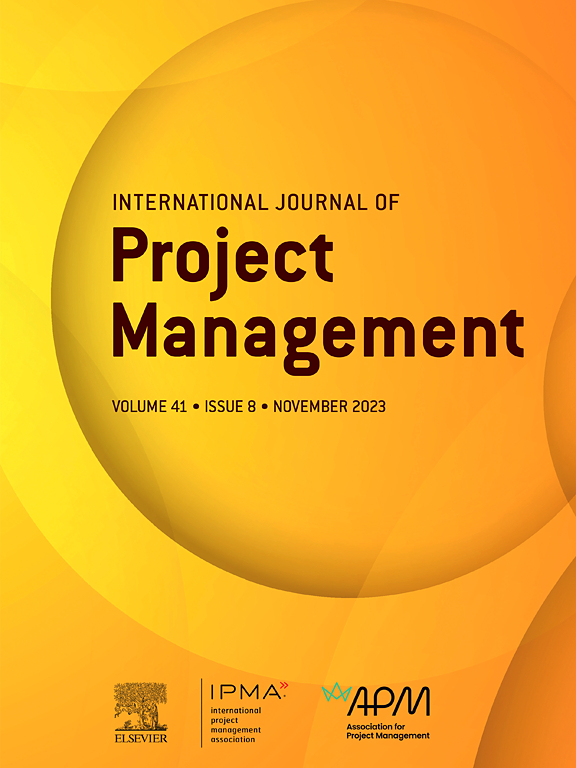Conceptualizing semi-temporary project networks through actor roles in smart city innovation
IF 7.5
1区 管理学
Q1 MANAGEMENT
International Journal of Project Management
Pub Date : 2025-09-09
DOI:10.1016/j.ijproman.2025.102763
引用次数: 0
Abstract
Our study examines the under-theorized, yet essential roles adopted by actors in fostering urban innovation, with a focus on the organization of project networks in smart cities, and conceptualizes these as semi-temporary project networks, a new form of organizing innovation. Specifically, it addresses two research questions: (1) How do actors adopt or create roles when organizing project networks for smart city innovation? and (2) How do these roles enable and promote innovation in complex, multi-actor environments such as smart cities? Drawing on two case studies of smart city project networks, the study identifies six distinct actor roles that contribute to innovation: i) the orchestrator, ii) facilitator, iii) integrator, iv) co-creator, v) tester, and vi) knowledge developer. By mapping the actors’ roles and linking them to project networks literature, we show empirically that the role of the orchestrator matters in project development, but some supporting roles in the specific innovation tasks become even more relevant than the orchestrator itself. The interplay between temporality at the project level and relative permanence at the relationship level forms the foundation of semi-temporary project networks for sustained innovation and collaboration across projects. This study has implications for project management literature, particularly on managing and organizing projects for societal impact, as well as for practitioners and municipalities interested in knowing which roles lead to effective smart city implementation.
通过智慧城市创新中的参与者角色概念化半临时项目网络
我们的研究考察了参与者在促进城市创新中所扮演的理论不足但却至关重要的角色,重点关注智慧城市中项目网络的组织,并将其概念化为半临时项目网络,这是一种组织创新的新形式。具体来说,它解决了两个研究问题:(1)在组织智慧城市创新项目网络时,参与者如何采用或创建角色?(2)这些角色如何在智能城市等复杂的多参与者环境中实现和促进创新?通过对智慧城市项目网络的两个案例研究,该研究确定了有助于创新的六种不同的参与者角色:i)协调者,ii)促进者,iii)集成商,iv)共同创造者,v)测试者,vi)知识开发者。通过映射参与者的角色并将其与项目网络文献联系起来,我们从经验上表明,协调者的角色在项目开发中很重要,但在特定的创新任务中,一些支持角色甚至比协调者本身更相关。项目层面的临时性和关系层面的相对持久性之间的相互作用构成了跨项目持续创新和协作的半临时性项目网络的基础。这项研究对项目管理文献具有启示意义,特别是关于管理和组织具有社会影响的项目,以及对了解哪些角色导致有效的智慧城市实施感兴趣的从业者和市政当局。
本文章由计算机程序翻译,如有差异,请以英文原文为准。
求助全文
约1分钟内获得全文
求助全文
来源期刊

International Journal of Project Management
MANAGEMENT-
CiteScore
12.30
自引率
26.20%
发文量
83
审稿时长
59 days
期刊介绍:
The International Journal of Project Management is recognized as a premier publication in the field of project management and organization studies. Our main objective is to contribute to the advancement of project management and project organizing through the publication of groundbreaking research.
We are dedicated to presenting fresh insights and new knowledge in various domains, including project management, program management, portfolio management, project-oriented organizations, project networks, and project-oriented societies. We actively encourage submissions that explore project management and organizing from the perspectives of organizational behavior, strategy, supply chain management, technology, change management, innovation, and sustainability.
By publishing high-quality research articles and reviews, we strive to revolutionize the academic landscape and propel the field of project management forward. We invite researchers, scholars, and practitioners to contribute to our journal and be a part of the progressive development in this exciting field.
 求助内容:
求助内容: 应助结果提醒方式:
应助结果提醒方式:


